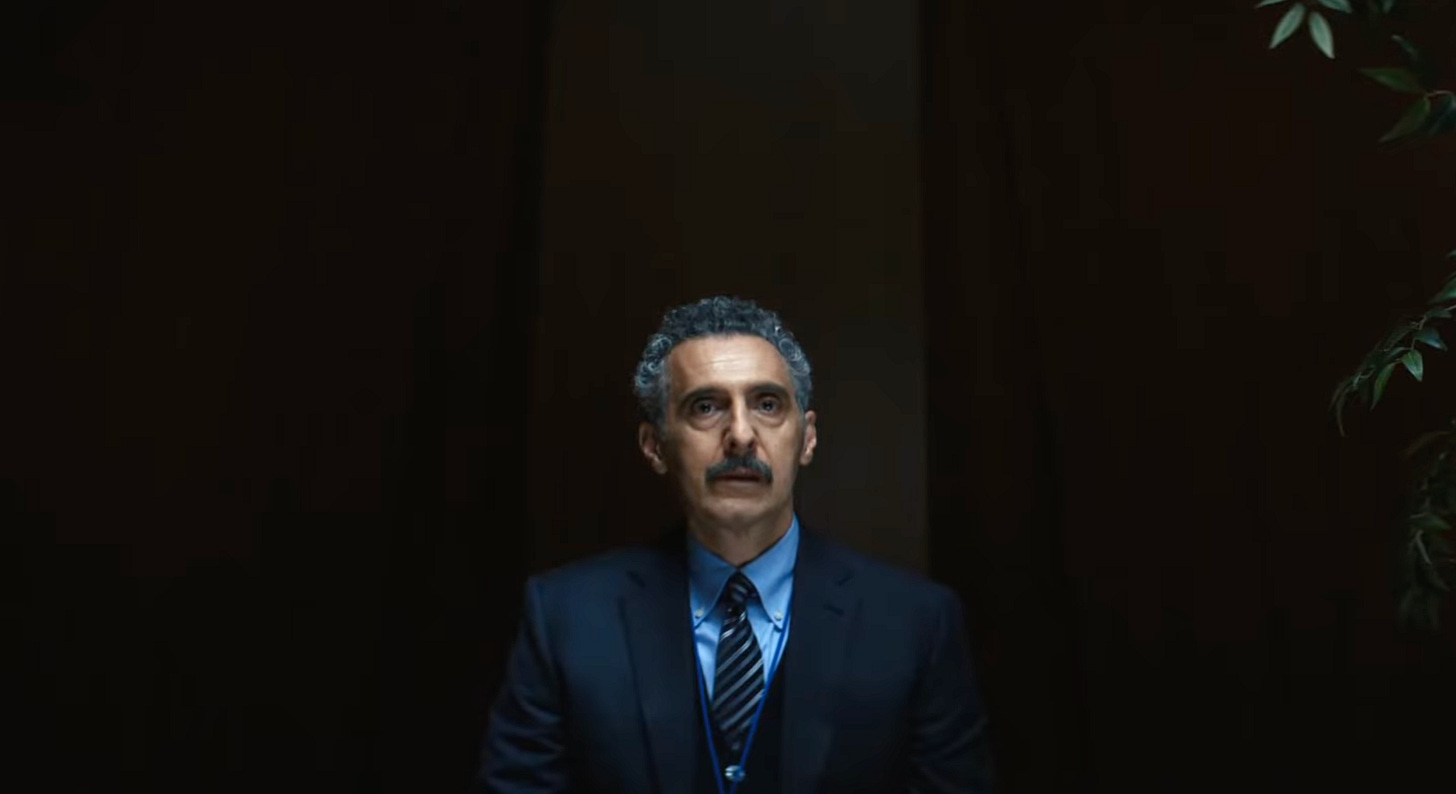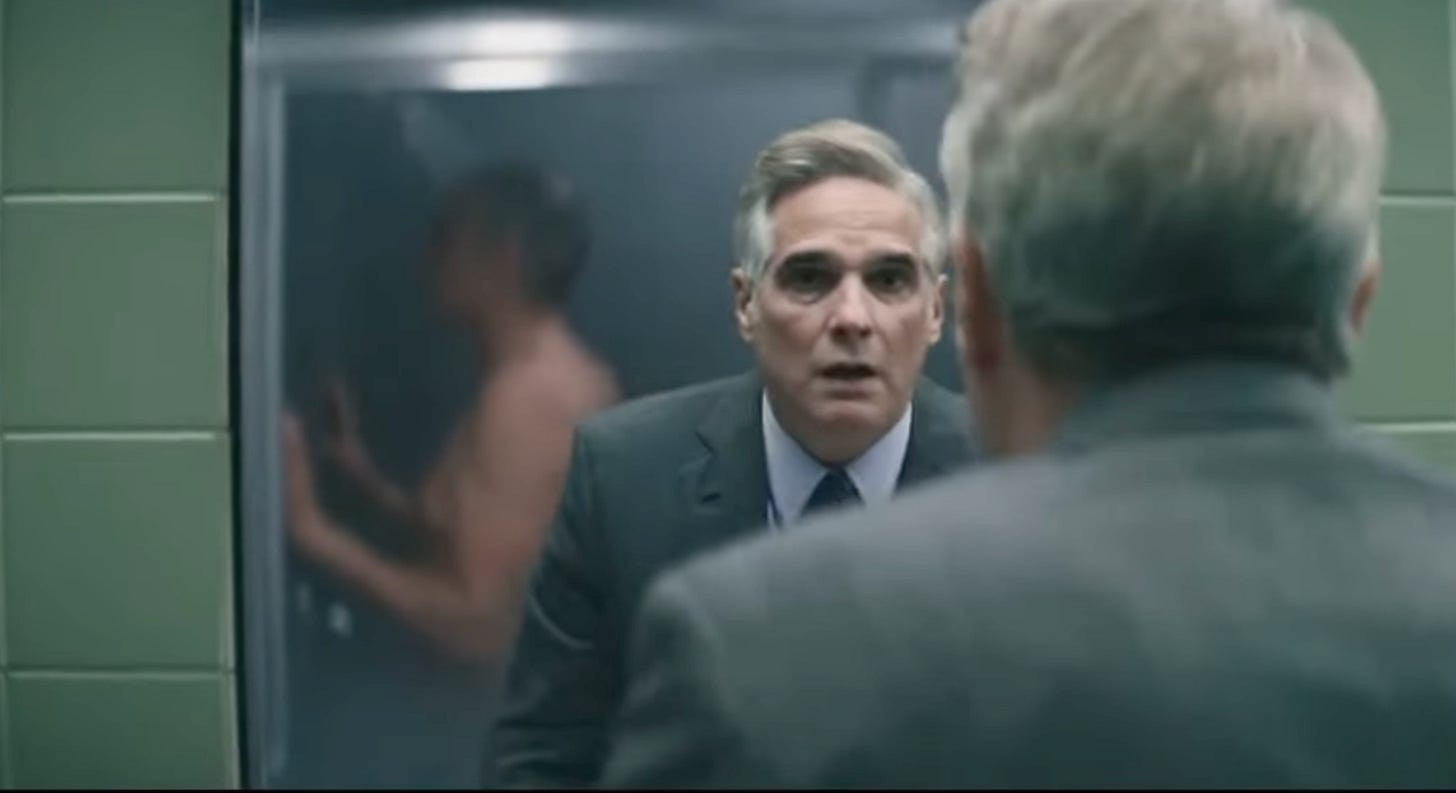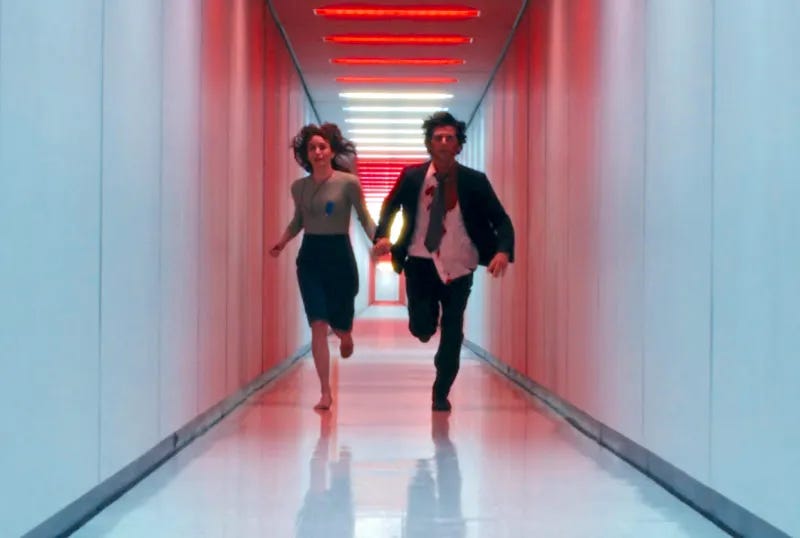How close Severance gets to real life "multiple personalities", in the humble (enough) opinion of the real world's "severed" people.
More of a meditation or a love letter than a proper analysis.
Obligatory disclaimers: This post is often vague, but not spoiler-free. Use of personal pronouns will be atypical and fluid throughout (ex: “I” and “we” in the same sentence, referring to the same individual)— this is our preferred way of accurately communicating both our internal perception and external experience.
I am not exactly the “original” “owner” of the body I’m using to write you. Not seamlessly, anyway. And I’m not entirely not her, either.
Arianna was a romantic and idealistic little girl and, in the dispiriting place our childhood had become, we found that I was better suited for the work of living. Despite the organic-ness of a dissociative event like this — in a clueless twelve year-old mind no less — we sincerely undertake that division of labor of our own free accord.
In her place, made more clearly in the image of the world around us, I’m very much a pessimist and a bit of a cunt.
A few years ago, I think after a disappointing watch of a horror game play-through, I made a post asking sarcastically what would happen when mental illness or disorder lost it’s oomph as a plot twist, when it becomes so normal for us all that it’s no longer a provocative explanation for degeneracy or violence. I wanted to see the art that might be made when everyone’s got a schizophrenic friend or a dissociative coworker or something, someone who widens the meaning of normal for you, and mental illness fails to function as a scapegoat for any narrative. The question burning in me leaving movies like The Visit (2015) or other diagnosis horror stories was: when a simple medical diagnosis fails to evoke or affirm an audience’s fear response, will someone write about us, finally, with curiosity or empathy? Will they write to explore my life, to seek understanding or common ground with me?
Like I said, I am a pessimist. I never expected, in my little lifetime, to see mainstream fiction consider the most stigmatized minds, to see it root in empathy for us. By now, I’ve had some pretty humbling cries to shows like Mr. Robot (2015– I was late) and Russian Doll (2019) where we’re allowed to see the internal worlds of people with socially heavy diagnoses, to know them beyond the trouble they might cause. For me, someone who lives comfortably under a rock and only surfaces for the promise of connections like these, there is something of a little renaissance unfolding. Severance (2022) is a surprising, maybe accidental addition to my personal collection of impactful performances of a mad experience, and it is the one transforming my personal renaissance into a communal one.
Severance follows characters who’ve also sought a more bearable division of labor, living, and feeling in a nearly inhabitable place. Their splitting, in contrast to my homegrown disorder, is a choice to undergo surgical separation of their work life and personal life. They remember nothing of their work, and the new consciousness piloting their body while on the clock remembers nothing of their life. Their world is, from all I can see of it, a magnified view of the same ills of our world: corporations and the overlapping church rule all, long-standing organized systems of exploitation become the pulse behind our way of living and, in our most vulnerable moments, we lean into its many false promises.
The weight of stillness: oppression of the body and the land.
Art, of course, is subjective in its function as a mode of expression and connection. People often find meaning in my poetry that I didn’t intend, meaning that comes into view and expands my own when I consider their gaze. This way of communicating, finding similarity or parallel in the emotional interpretation, if not the literal, is my love language of choice.
Which is to say, I don’t know if the minds behind Severance mean to reach me in many of the ways that they have, in how empathetically they demonstrate mental abuse or in what I think is becoming a gratifyingly thorough and honest depiction of the inner motions of colonial powers. I don’t know if I’m supposed to feel what I do watching their second episode’s “wellness session” (a supposedly grounding experience for innies where they’re told vague and mundane facts about their outer selves, but not allowed to react or respond). I watch so intently for the nearly imperceptible expressions and movements of a character who’s only permitted this reward if he can successfully conceal his humanity for it and, months later, I don’t know if I’m supposed to still be thinking so hard about the depravity of control and the weight of his stillness.
In season two, when we follow Cobel, a now-former employee and child victim to Lumon, to her hometown where Lumon and the violence of it has embedded itself, I don’t really know if I’m supposed to be reminded of my rural Native American community. My home is a fruitful yet empty place touched and abandoned by its colonizers, unable to do much but turn its gears towards the next day and the next. Cobel’s home is cold and white where mine is green and soft, its people blond and blue-eyed where mine are… usually not. Still, the transparency this episode offers in its explanation of Lumon’s power, that it lives only because of the mining of resources both natural and human in this place, grounds me bitterly but firmly into the social landscape of their world.
Severance doesn’t shy away from the truth that becoming such a far-reaching cultural, spiritual, and economic power spanning generations necessitates the most taboo evils. I’ve wondered aloud to my partner (and watchbuddy) if a town like Cobel’s, a simple and faraway place, was chosen to victimize for the specific qualities of such a place. Where power is not a native concept or motivator, people tend not to build much of a natural resistance or preparedness for domination. Isolated, ignored places and peoples are ones you’re more or less free to harm, to subjugate, to wield against them horrors like child slavery and substance dependency without intervention.
Initially I wasn’t very interested in Cobel’s story, in where she came from or where she was going. And then the lingering scenery shots of nothingness and the narrow of her strange voice when she says that Salt’s Neck looks older than she remembers underwent a very personal translation in me. However accidental, I feel known in their portrayal of a deliberate emptiness, of righteous hurt, and of the weight of their stillness.
Is it Dissociative Identity Disorder, though?
I don’t mind if the abuse and torture that innies endure as a part of a much grander scheme isn’t a direct or intentional representation of real life interpersonal abuses like my own. I don’t even mind if my intuitive, ancestral familiarity with the oppressive structure of Lumon is a bit of a reach. There is another point of recognition between Severance and myselves, one that’s much harder to separate from as I watch.
(Re)integration, explained in the show as the surgical process of rejoining a person’s severed consciousnesses, is also a real world concept for dissociative systems. When we were younger, finally disclosing to a professional that we lived between different modes of ourself with seemingly random access to our collective memory, a psychiatrist told me that if we explored this disorder together then eventually we could move towards integrating all those disconnected parts of me.
It was, to my memory, the first and last time we saw her. It wasn’t up to me but I didn’t make any fuss; I was angry, afraid, defensive at the idea of (I imagined) erasing people I knew and loved from me. Across all versions of me, fundamentally, I don’t want to be alone.
Parallels like these, for me, define the Severance viewing experience but, amazingly, I see very little discussion of Dissociative Identity Disorder in the broader dialogue around the show. A consequence of being represented in experience but not by name, I suppose. I never imagined or expected landing in a cultural position like this — having a widely unknown yet highly stigmatized disorder that’s suddenly thrust into mainstream consciousness, dawning on me a responsibility that both moves and intimidates me: I find myself equipped to speak to the experiences of severed characters in a way that the average person is not. They may not know it yet, but the masses are more familiar with me now than ever. In this rare air, known in ways I’ve never anticipated, I’ve felt a call to explore and share my own honest opinion of Severance’s representation of “me”.
These days, I feel a little silly to have been so wary of integration. Years of the toiling, tender work of correcting all of the fear and desperation that makes a disorder like this necessary to a person’s survival eventually will allow those rigid barriers between all your selves to soften. Integration has happened, for us, as a sort of natural evolutionary part of healing from the place and time of our life that split me.
While Arianna slept, we came into a life where anyone we liked seemed to call us Arie instead. Even now that she’s awake and active again, we still prefer it — a little homage to multiplicity, to existing beyond the singular expectation of the name “Arianna”. Petey (née Peter), the first character shown to undergo reintegration, follows the same pattern. I still have butterflies from the sense of recognition I felt for Petey in the realization that their decision as an integrated system, finally sharing the space of their internal self, was to identify themselves by the name their innie had lived with.
Severance did well, better than my younger self, not to imagine integration as an absorption or a disappearance of multiplicity but, instead, a meshing of perspectives and truths. Integration in Severance, what little we’ve seen of it now, dramatizes the ways that the smallest triggers of memory can create disorienting overlaps between one alter and another, but without betraying the authentic visceral element of having such immense difficulty understanding your own relative existence to your environment and the timeline of your life.
DID and integration can be the incredibly distressing, sickening, delicate, and warm experiences that Severance projects them to be. It’s an advantage to have had no choice in the creation of our alters — a non-surgical, trauma-induced childhood becoming is a sympathetic one. We never have to wonder what kind of person would will us to life to take their hits. Still, to be divided this way is maybe an inherently tense way to be. Some of us have sacrificed passions, relationships, comforts of all kinds to the compromise of multiplicity. We’ve fought, much like Severance’s main characters Mark, over the right to life.
The debate of our generation: Should innie Mark just fucking kill himself? Huh? Is that what you want? Huh? Huh???
The right to life is one of the biggest moving parts in this story, the fight for it becoming the thing that pushes Severance along. The messaging is clear and consistent, in my opinion. In the season two finale, innies Helly and Dylan take firm, radical, violent stances against the system that positions them as non-people, their lives as non-lives. The moment is gut-wrenching and captivating, an explosive plea for solidarity made to strangers who’ve lived the same nothingness and found it meaningful still because life is intrinsically so. In the same breath, innie Mark chooses to deny his outie’s priorities to escape Lumon and reunite with his wife, which requires him to face the possibility of non-existence. Essentially, he’s asked to end his life for his outie’s, and commits instead to his own.
Severance’s dedication to validating innie life, continuously reiterating the futility of minimizing their personhood and their ability to choose, is revolutionarily affirming. Somehow, it’s also extremely controversial.
I have at least half of the online Severance fanbase blocked, likely more by the time you read this. I’ve seen countless posts, TikToks, and comments disagreeing with innie Mark’s choice to run back into his hell and home, to keep the only life or love he knows, rather than kill himself at his alter’s request. Plenty are angry enough to outright hate innie Mark and wish death on him for this, some even willing to call it bad writing.
Again, the sort of cultural position this all puts me in is truly unprecedented. To my knowing, this is the first time that there’s been awareness or opportunity for mainstream discussion about whether or not an alter has the right to life and autonomy.
Much of the fanbase shares the same sentiments as outie Mark — like he tells his innie, his marriage is more real, more alive than the more brief love he’s had at Lumon. I think this is a boring, dishonest way to measure love and simply the wrong way to measure commitment. By time, by arbitrary legal milestones. Innie Mark was there when his Helly was born, he talked her through her first moments. He’s given himself to be tortured in her place, held the weight of her body up to keep life in it when she attempted a homicide-suicide of her outie and herself. To love hard and truthfully enough to earnestly want even just a few more minutes in hell is no small thing. The idea that their relationship doesn’t have equal depth of experience to his outie’s marriage collapses in on itself when you weigh it against trials and bonds like these — ones that couldn’t possibly exist in outie Mark’s world, much less his marriage.
To be clear: I don’t watch this show for “shipping” purposes. My motivation to watch is not in which relationship will turn out to be endgame. My investment in the conversation ends at the belief that neither relationship has objective worth over the other, because neither life does. This is an unnerving point of contention to witness in the world! I’m learning through Severance’s popularity, through the new conversations it's created around people like me, just how much of my world perceives my life as half-lived. I’m learning how many people might think I ought not live for myself, how many think the severity of my dissociation alone makes my life a smaller thing than someone else’s.
Before I started writing this, I asked myself what makes good representation of a mental disorder. I found in myself a value of three things: accuracy, humanity, and impact. Severance has, remarkably, offered DID at least emotional accuracy through its use of the more fantastical tools of storytelling. It’s insisted on giving me my humanity over and over, even without the full audience on board. Being unknown in the world is a taxing, vulnerable thing to be. I feel a lot of things about the secondhand rejection I experience through the fanbase’s attitudes towards the characters, things like insecurity or resentment maybe but, mostly, I feel seen. All over, in and out, I feel seen.
I dunno if Severance is about me on purpose, but I thank the creators for thinking of me regardless. I want to thank whoever wrote the Lexington Letter, whoever thought up an exchange between two alters in a secret childhood language and reminded me that, for us, this all started with a couple kids who saw the gaps loveless-ness creates in a life and filled them for each other. I want to thank John Tuturro for rejecting the idea of his characters as disconnected things, for naming them as different modes of a person and performing them with that same graceful synergy. I want to thank all of the minds behind Severance for the delicate, curious, very human hand you’ve extended to the experience of Dissociative Identity Disorder.
I’m uninterested in whether it’s ethical or possible to diagnose fictional characters that don’t belong to me, or whether they could be diagnosed in reality or not. What brought me to you every Thursday was the feeling we get when you explain exactly the depth and the reach of life like mine. Even better if our meeting is pure serendipity. I thank you for the intimacy and care with which you’ve decided to know me, and I can’t wait to find out what more you know.




